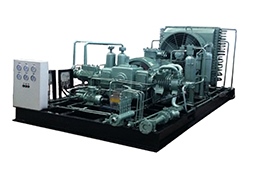Sales Department: 0552-3825188 0552-3825333
Accessories Department: 15955260712
Company Fax: 0552-3825255, 3825200
CNG Department: 13865028777 13865066118
After-sales service: 0552-3825155 0552-3825156
Company Address: No. 2581, Shuangdun Road, Huaishang District, Bengbu, Anhui Province
Company email: zdysj@126.com ahzdysj@126.com
Differences between biogas compressors and natural gas compressors
The biogas compressor VW-8.6\/80 is a compressor specially developed and designed for biogas. It can not only improve the problem of insufficient biogas pressure, but also make biogas burn more fully and with greater firepower. Due to the negative pressure of the biogas compressor exhaust pump, the air intake in the biogas tank is more sufficient, and it is widely used in various biogas tanks and long-distance biogas transportation.
Natural gas compressors are mainly used to compress natural gas (including methane, propane, etc.) with relatively high pressure and high risk level.
But generally methane cannot be liquefied at room temperature. The critical temperature of methane is -82.59 degrees Celsius, which means that above this temperature, no matter how much pressure is applied, methane will not liquefy.
Methane can be compressed above the critical temperature, and the compressed methane is still a gas, not a liquid. Therefore, it is theoretically feasible to use cylinders to store purified compressed methane as fuel.
The problem is that there are many key factors, such as industrial development value, market value, energy recycling cost, etc. Therefore, biogas is generally used through gas pipelines.
Biogas compressors differ from natural gas compressors in the following aspects:
1. Good air tightness: Strict air tightness testing is carried out from the air inlet to the air outlet, no air leakage, no leakage under 6.8KPa pressure.
2. Simple structure; no external pipeline between 2 symmetrical air chambers.
3. Acid and alkali resistance: The channels from the air inlet to the air outlet are all acid and alkali resistant plastic or rubber parts, which can pass weakly corrosive gases rich in water vapor.
4. Long life: The gas circuit and the circuit are strictly separated, and the electrical life will not be affected by the gas containing water vapor. 5. Good maintainability: It can be repaired by yourself with simple tools and accessories.
5. Easy to operate: Biogas compressors are smaller in size and occupy less space than natural gas compressors, so they are easier to install and operate.

Related Industry Knowledge
- Hydrogen compressor equipment structure and preparations before start-up
- What are the factors to consider when choosing an air compressor?
- What is a compressor?
- The correct operation method of air compressor
- Take you to understand the use of vinyl chloride compressors
- Analysis of Factors Affecting Production Capacity of Hydrogen Compressor
- The difference between biogas compressor and natural gas compressor
- Protective measures for hydrogen compressor and its auxiliary systems
- The composition structure of the air compressor
- How to choose a good air compressor?
- How air compressors work and how they work
- What are the functions of oxygen compressors?
- Introduction and precautions of liquefied gas compressor
- Composition and installation analysis of carbon monoxide compressor
- Introduction and precautions of liquefied gas compressor
- The structure of air compressor
- Operation process of liquefied gas compressor
- The principle and use of natural gas compressor
- What is the clearance volume of the compressor?
- Inspection steps before commissioning liquefied gas compressor



